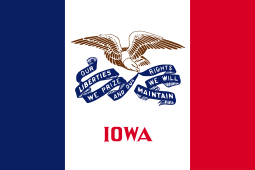Karl M. LeCompte
Karl Miles LeCompte (May 25, 1887 – September 30, 1972)[1] was a ten-term Republican U.S. Representative from south-central Iowa. He won ten consecutive races from 1938 to 1956, before choosing not to run again in 1958.
Karl Miles LeCompte | |
|---|---|
 Rep. Karl M. LeCompte, 1953 from Congressional Pictorial Directory | |
| Member of the U.S. House of Representatives from Iowa's 5th district | |
| In office 3 January 1939 – 3 January 1943 | |
| Preceded by | Lloyd Thurston |
| Succeeded by | Paul Cunningham |
| Member of the U.S. House of Representatives from Iowa's 4th district | |
| In office 3 January 1943 – 3 January 1959 | |
| Preceded by | Henry O. Talle |
| Succeeded by | Steven V. Carter |
| Personal details | |
| Born | May 25, 1887 Corydon, Iowa, U.S. |
| Died | September 30, 1972 (aged 85) Centerville, Iowa, U.S. |
| Political party | Republican |
| Alma mater | University of Iowa |
Born in Corydon, Iowa to Charles Francis and Hannah Miles LeCompte. LeCompte attended the public schools and graduated from the University of Iowa at Iowa City in 1909. One year later (in 1910) he became owner and publisher of the Corydon Times-Republican. In 1916, at age 29, he won election to the Iowa Senate, becoming its youngest member.[2] In 1918, during the First World War he served as a private in the medical detachment of United States General Hospital No. 26, but did not serve overseas. His service in the Senate ended in 1921.
When Republican U.S. Representative Lloyd Thurston ran for the U.S. Senate in 1938, LeCompte ran for his seat in Iowa's 5th congressional district. In a successful bid for the Republican nomination in the primary, his advertisements stressed that he was "inalterably opposed to the New Deal Program of waste and extravagance."[3] In the general election, he defeated Albia, Iowa Postmaster Ruth F. Hollingshead, the first woman to run for Congress in Iowa, and began serving in 1939. In his first term, he served on the Committee on Public Lands and the Committee on Insular Affairs. He was re-elected to his 5th district seat in 1940, before redistricting in 1941 retitled the same set of counties as Iowa's 4th congressional district. He was not seriously challenged until 1948, when attorney and Democrat Steven V. Carter first ran against LeCompte, and came within 4,000 votes of unseating LeCompte. LeCompte easily prevailed in the next three elections before Carter again came within 2,000 votes of unseating him in 1956. After the 1956 election, Carter filed a challenge against the result with the U.S. House, which decided two years later that LeCompte was properly declared the winner.
He served as chairman of the Committee on House Administration in the Eightieth Congress (from 1947 to 1948) and in the Eighty-third Congress (from 1953 to 1955).
Rather than running again in 1958, LeCompte retired, and Carter won the seat on his fourth attempt. In all, LeCompte served in Congress between January 3, 1939 and January 3, 1959. LeCompte voted in favor of the Civil Rights Act of 1957.[4]
After his last term in Congress, LeCompte returned to newspaper publishing. He later retired but continued as a contributing editor.
He died in Centerville, Iowa, on September 30, 1972. He was interred in Corydon Cemetery, Corydon, Iowa.[5]
References
- "Guide to the Karl LeCompte Papers". The University of Iowa Libraries. Retrieved 2018-08-04.
- "Farmers Scarce in Gen'l Assembly," Waterloo Times-Tribune, 1916-12-13, at 6.
- Karl M. LeCompte Advertisement, Moravia Union, 1938-06-02 at 4.
- "HR 6127. CIVIL RIGHTS ACT OF 1957". GovTrack.us.
- "Karl Miles LeCompte (1887–1972)". Find A Grave. Retrieved 4 August 2018.
External links
- United States Congress. "Karl M. LeCompte (id: L000157)". Biographical Directory of the United States Congress.
- Karl Miles LeCompte Memorial Library at Corydon, Wayne County, Iowa
| U.S. House of Representatives | ||
|---|---|---|
| Preceded by Lloyd Thurston |
Member of the U.S. House of Representatives from Iowa's 5th congressional district 1939–1943 |
Succeeded by Paul Cunningham |
| Preceded by Henry O. Talle |
Member of the U.S. House of Representatives from Iowa's 4th congressional district 1943–1959 |
Succeeded by Steven V. Carter |
![]()

